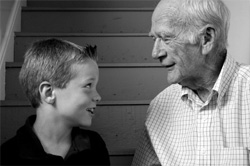
A wife complains to her husband, "You have got to tell your mother to stop showing up to visit the kids unannounced. I feel like I have to drop what I'm doing, and it gets in the way of everything!" Here is the traditional conflict: the well-intentioned grandparent, the frustrated parents.
"Grandparents can help in the rearing of good families. Unfortunately they can also hinder" (Miner 68).
Most parents have to navigate these waters. How do we get to that wonderful place where Grandma and Grandpa are supportive but not overbearing? How do we make sure we're not taking advantage of our parents? Most important of all--How do we help our children and our parents have the best relationship possible?
Talk It Out
Is it okay for Grandpa to give your daughter her first set of scriptures, or were you planning to do that yourself?
What do you want to have happen on Sunday visits at Grandma's house?
Do your parents realize that kids need to use car seats?
How do you feel about Grandpa handing out treats at every visit?
Hoping Mom and Dad will just "get it" and know what we want doesn't go very far. Creating positive relationships between parents and grandparents requires a lot of clear, respectful communication, and this includes honoring each other's wishes.
"Creating positive relationships between parents and grandparents requires a lot of clear, respectful communication."

Talk Positively and Respectfully
"I want as many people to love my kids as possible, and for my kids to love them back," you may say. Even if you don't have a great relationship with your parents, your kids may still get along well with them. As long as there aren't any potentially harmful situations, it's best to be positive about your parents to your kids.
The strength of the grandparent-grandchild relationship is largely up to the parents. Being willing to discuss items that are and aren't working is the key to creating positive relationships.
One couple asked a set of grandparents to stop bringing small gifts for the children at every visit because the gifts started to distract from the visit. Another taught their parents how to use car seats.
We need to ask about our parents' expectations as well: Are they okay with babysitting? How long should visits last?
Grandparents have a lot to give
Researchers have found the grandparent-grandchild relationship can have lasting positive effects. It's worth putting in effort to help your kids know your parents. Interviews with grandchildren conducted by family science researchers Olsen, Taylor, and Taylor (pp. 138-139) highlight some of the things grandchildren appreciate:
- Grandparents are family historians, which helps grandchildren find their identity in a larger context.
- Grandparents are mentors and teachers. They are "the heroes that many children seek to pattern their lives after."
- Grandparents are playmates to grandchildren. It's nice for kids to have a fresh audience to perform for once in a while. And your parents may surprise you with a sense of fun that seems to have been born along with your first child. (Is that the same person who raised me?)
Let them give it
Sometimes grandparents hesitate to participate in their children's families because they are unsure about expectations. We can make an extra effort to invite grandparents in.
Communication between you and your parents has significant payoffs: Whether grandparents live close by or far away, they can offer us a lot as we parent. Many times grandparents have resources that parents do not, and they may be able to reach our children in ways we might not.
Help your kids tell Grandma and Grandpa how much they mean to your family.
Remember, Manners Matter
We need to express to our parents how much they mean to our family, and we should teach our children to show respect for their grandparents.
Check It Out
If possible, have a "Grandparent Library." It's likely that grandparents have copies of books and periodicals parents don't have. (Did your grandparents have an amazing stash of National Geographic magazines?) Visits to Grandpa's house can take on the added dimension of discussing the latest read.
Welcome Good Listeners
Because parents often have little free time, "listening may be one of the biggest contributions a grandparent can make" (Miner 68)--in person or by phone. One family has a set time each week to call one Grandma and calls the other whenever needed (when someone loses a tooth, etc.) because this is what works for them.
Learn Of Great Grandparents
Grandparents could write a story about ancestors the grandchildren have never met and send it to them (McCowin 72). As parents, we can ask our parents about ancestors we want to know more about and share these stories in family home evenings.
Try Pen Pals
What if grandparents do no live close by? Grandparents can keep in touch with grandchildren through letters, postcards, e-mail, or even a family newsletter (McCowin 72).
Time Matters
Spend time together doing what you love. One grandmother who is single and loves going to plays will bring a grandchild along. A granddaughter has joyful memories of organizing a shed with her grandpa. Some of the most memorable moments for grandkids are simply spending time with grandparents. Are there ways you can help these simple but important moments take place?
Have A Ball
Perhaps the best advice of all to grandparents is to "have as much fun as possible with your grandchildren" (Walker 2). One grandmother let her grandchildren set up a huge blanket hut in the basement. Instead of tearing it down at the end of the visit (as Mom would do), she set out flashlights and other supplies at the hut door for the next time they came. The grandkids were thrilled!

Caroline Eyring Miner recounts some of her memories of her own grandparents; some might ring true for you as well. "They weren't just ordinary adults, after all. They had a boxful of toys of their own that they would let us play with when we visited . . . . And though many of the particulars changed as I grew up, that basic feeling remained the same. Grandparents were different, perhaps even a little magic in ways" (68).
Grandparents can strengthen families in ways parents alone sometimes cannot. They can also support lessons parents are teaching children. When parents foster the relationship between their children and their parents they will be richly rewarded for those efforts.
"Mom, I don't know what I'd do without you!" we finally learn to say. With age comes a more full appreciation of what our parents offered us. They can continue to be a rich resource of love and support, not only to us as we parent, but to our children as well.
Sources
McCowin, Bernice. "Being Grand Grandparents." Ensign. Oct. 2002: 72-74.
Miner, Caroline Eyring. "Makers of Moons and Testimonies." Ensign. Sept. 1978: 68-69.
Olsen, Susanne Frost, Alan C. Taylor, and Kelly DiSpirito Taylor. "Intergenerational Ties, Grandparenting, and Extended Family Support." Strengthening Our Families. Ed. David C. Dollahite. School of Family Life, Brigham Young University, 2000. 135-141.
Walker, Steven C. "Papi Days: Savoring Your Grandchildren." Unpublished article.